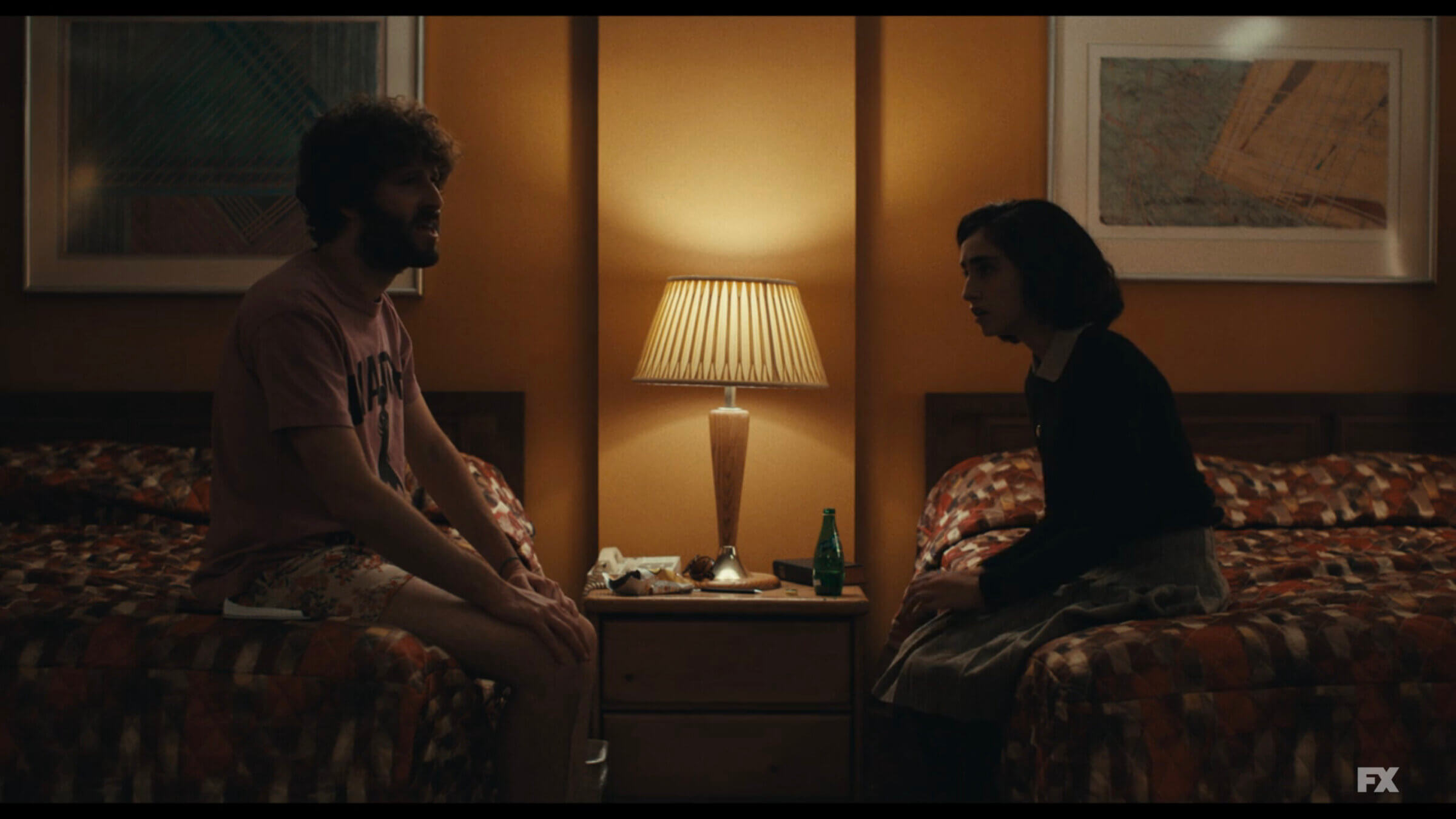What was Anne Frank doing in a Jewish rapper’s quest to go viral?
Her cameo in the third season of ‘Dave’ makes an impression, but may leave viewers confused

Lil Dicky hallucinates Anne Frank in the May 3 episode of Dave. Image by screenshot/Hulu
The third season of Dave, the FX comedy created by and starring Jewish rapper Lil Dicky — real name Dave Burd — finds the title character on tour and burning out. What better to shake him up than a near-death experience and a hallucinated encounter with Anne Frank?
“Really enjoyed the Anne Frank episode of Dave” is a sentence that I wasn’t expecting to say
— Emily Nussbaum (@emilynussbaum) May 5, 2023
In the season’s sixth episode, “#RIPLilDicky,” the Philadelphia rapper’s bus explodes on the side of the road with no one inside, sending the entourage wandering through Death Valley to the nearest possible Wi-Fi network. When the group arrives at a diner, they discover that a video posted to social media from the scene causes the world to believe Lil Dicky is dead. Rather than tell the world he’s fine, Lil Dicky’s manager convinces his hirsute client to ride out his 15 minutes of fame as a rising talent gone too soon by hiding in a hotel room.
“I gotta sit here like Anne Frank all night?” Lil Dicky protests. “You look like her when you shave,” his manager shoots back. Soon after, the character of Anne Frank, who was discovered hiding in an Amsterdam attic and died in the Bergen-Belsen concentration camp, makes her appearance.
The show makes regular reference to Philadelphia-born Burd’s Jewishness as an aspect of his whiteness, which is portrayed as both an obstacle and an asset in his quest for rap stardom. Anne Frank’s appearance was not the first reference in this episode — as they’re trudging down the highway, Lil Dicky remarks that he can’t imagine how Jews wandered all that time through the desert. Introducing Anne Frank raises the stakes in a way the show can’t quite pay off.
Having missed several doses of his medication, Lil Dicky has a vision of Anne Frank, to whom he explains his predicament, and discusses the anxiety that comes with fame. Wearing the white collared blouse and black sweater Frank was photographed in, Anne, played by Alma Marian, serves to indirectly remind the rapper of his first-world problems.
She also provides comic relief: Lil Dicky tells her that LeBron James is following him now — no, he quickly reassures, not the Nazi kind of following! How do you explain Twitter and Instagram to Anne Frank? And here’s Lil Dicky showing her the viral “Whip / Nae Nae” dance.
“Today in America, they can kill you while you’re alive,” the rapper rambles to his hallucination, explaining his fear of being canceled for faking his death. “Which in my opinion is worse than being dead. Although I can’t speak to — I don’t know how you were killed. How did you die?”
“In a camp,” Anne replies, in an accent that sounds as Israeli as it does German.
When Lil Dicky spills the news that Anne’s father published her diary, the girl becomes irate as the rapper tells her, in the scene’s punch line, “No one came out of the Holocaust looking better than you!” Then his manager barges in to tell Lil Dicky they have to leave, and Anne hides in a closet. On the way out, he looks back, and Anne does the whip. He nods.
Later in the episode, sufficiently grossed out by his virality plot, Lil Dicky reveals himself to the world, Anne appears to him once more, doing the whip again before the credits roll.
It’s unclear why Anne Frank was cast for this episode, which reprises her long-since cliched role as the Jewish man’s artistic muse. If her cameo is supposed to mean anything deeper than an ironic play on being trapped in a room, or a twisted parallel to fame wrought through death, I’m not seeing it. The show does not, for example, reference the book’s place in contemporary culture wars, or contextualize her suffering with rising antisemitism in the U.S.
Out of the many ways a conversation with Anne Frank could have gone, it ended with a meme.
A message from our Publisher & CEO Rachel Fishman Feddersen

I hope you appreciated this article. Before you go, I’d like to ask you to please support the Forward’s award-winning, nonprofit journalism during this critical time.
We’ve set a goal to raise $260,000 by December 31. That’s an ambitious goal, but one that will give us the resources we need to invest in the high quality news, opinion, analysis and cultural coverage that isn’t available anywhere else.
If you feel inspired to make an impact, now is the time to give something back. Join us as a member at your most generous level.
— Rachel Fishman Feddersen, Publisher and CEO






















